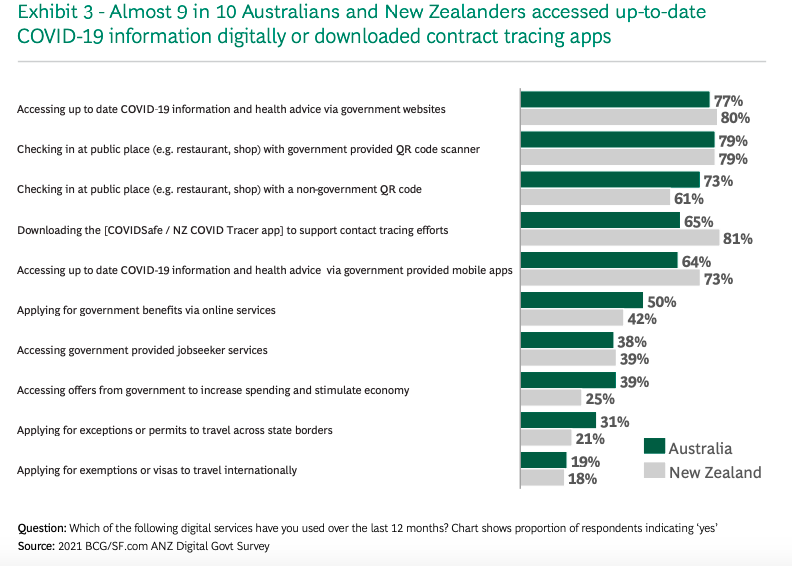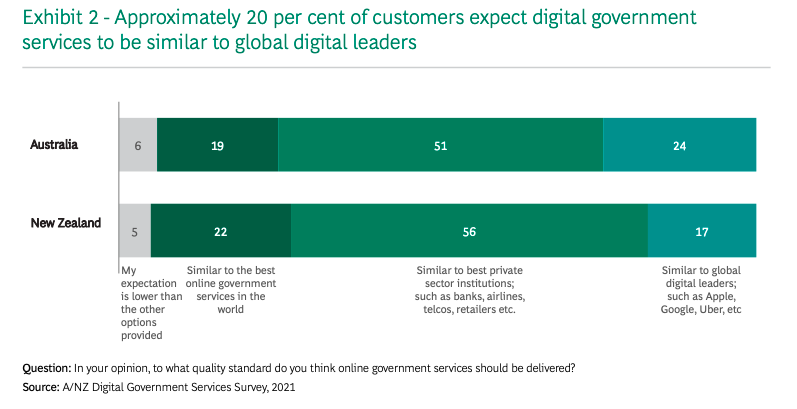Australian citizens have given the government huge amounts of personal data via telehealth, contact tracing, venue check-ins, welfare payments and vaccine distribution during the pandemic.

Despite this, trust in government has increased over the last 12 months, according to a new report.
The Trust Imperative 2 report from Salesforce and BCG surveyed almost 3,000 people across Australia and NZ and interviewed 24 government leaders and experts in March 2021.
The report shows 89 per cent of citizens and businesses in Australia and NZ said they used at least one COVID-19 digital government service during the pandemic, including telehealth, contact tracing or venue check-ins.
Thirty-eight per cent of Australians engaged with digital government services more than once a week between March 2020 and March 2021.

Trust increases
The research suggests that using pandemic technologies has boosted public trust in government, with customers prepared to consent to their personal data being used as a trade-off for more personalised services.
In the last 12 months, 52 per cent of Australians surveyed said their trust of government services had improved and 39 per cent said digital services are better than they were a year ago.
“Our research in 2021 demonstrates that the service quality and trust relationship has strengthened,” the report says.
Similar findings that trust in government had increased during covid were made in research published in the Australian Journal of Public Administration earlier this year.
Data sharing
Around 70 per cent indicated they were willing to share personal data to get a more personally tailored service, provided the benefits and safeguards were communicated clearly and it made their lives easier.
Gisele Kapterian, Director of Public Sector Strategy at Salesforce APAC says this is something that governments can leverage.
“Successful delivery of customer experiences provides the trust and permission needed for governments to continue to get closer to their customers,” she said.
Seventeen per cent were willing to share any data while 25 per cent of would only share the bare minimum and 7 per cent said they wouldn’t allow data sharing at all.
About half of those surveyed expressed concern that their personal information could be used without consent, and 44 per cent said they were concerned that data would be used in a way that didn’t serve their best interests.
High standards expected
The research also shows that customers have high expectations about the quality of government services.

About 20 per cent said they expected digital government services to be on par with those offered by the likes of Amazon, Facebook and Google.
More than half expect governments to match the standards of banks and telcos.
The report says 87 per cent of customers want governments to engage with them proactively – for example by offering notifications, information or services based on individual needs.
But this doesn’t mean they can disregard privacy, and government agencies should:
- avoid using customer data in an unexpected way, even if it benefits the customer
- engage with customers
- come clean about data breaches
Miguel Carrasco, Senior Partner and Managing Director at Boston Consulting Group, says the findings should give governments more confidence about personalised and proactive service delivery.
“Customers have said they want it and are comfortable sharing their data to enable it, as long as the data is secured and the benefits of doing so are clear, tangible and immediate,” he said.

State v state
According to the research, the NSW government outperformed its state and territory counterparts over the last year with 62 per cent of customers saying their confidence had increased compared to an average of 51 per cent in other states.
In terms of service quality, NSW was also the stand-out with 45 per cent of customers saying service in the state had improved, compared to 40 per cent in Victoria, 38 per cent in Queensland, South Australia and Northern Territory, 37 per cent in Western Australia, and 36 per cent in the ACT and Tasmania.
However, Western Australia saw higher than average adoption of digital services.





Leave a Reply